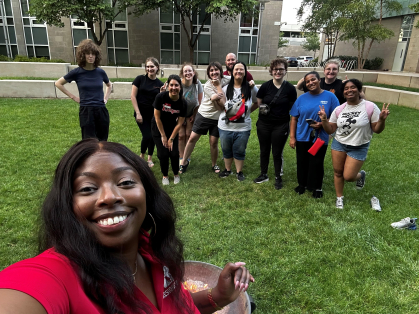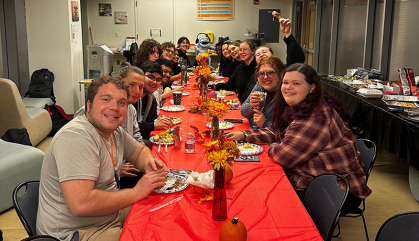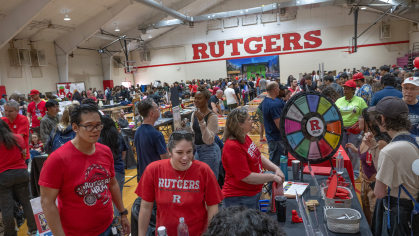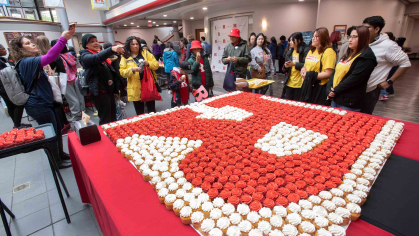At Rutgers’ Open Arms Community, There’s a Space for Difference to Thrive

A new living-learning housing concept provides a sense of belonging and security for students who are neurodiverse and disabled and their allies
For Kiera Josefsberg, a filmmaking and arts management student at Rutgers University-New Brunswick, her first year living on campus was a lonely and solitary experience.
“I was in a single dorm room, in a far corner of the hall,” said Josefsberg. “I didn’t get much of an opportunity to talk with other people who were in a similar situation as me.”
Diagnosed with autism and ADHD in elementary school, the 19-year-old said she often feels misunderstood and overwhelmed in social settings. Integration challenges were magnified at the university, where consistent socializing is expected of students.
Then, at the start of her second year at Rutgers, Josefsberg found the Open Arms Community, which provides on-campus housing for students who are disabled and neurodivergent.
From day one, everything felt different.
“I’ve been able to meet other individuals who are going through similar struggles and not feel the disconnect from being neurologically different,” Josefsberg said.
It feels good knowing that I’m not alone, and to have the Open Arms Community as a support system.
Kiera Josefsberg
As the first residential community of its kind at Rutgers, and one of the few on any college campus in the United States, Open Arms provides social salvation for 22 Rutgers-New Brunswick students. Backed by the student support unit in residence life and located at Livingston Apartments, Open Arms welcomed its first cohort during the 2024-25 school year.
“Creating space for students to engage on topics related to neurodiversity and disability was important to us at Rutgers,” said Kimberly Kosinski, assistant director of student support in the Department of Residence Life, within the Division of Student Affairs. “This population can often feel misunderstood by peers. Having a place to explore these issues together has helped many students feel more at home.”
The Open Arms Community is part of a broader Rutgers Residence Life initiative that brings together students with similar interests or lived experiences. Called living-learning and thematic living communities, participating students often co-enroll in common courses and live in the same residence halls. Topic areas range from art to engineering, health care to business. Thematic communities include Rainbow Perspectives, a LGBTQIA-affirming housing option; the School of Arts and Sciences Honors Housing; and even a weather watchers club.
“These communities are a wonderful opportunity for students who are undecided about their major or want to explore a particular academic topic,” Kosinski said.
The idea for Open Arms originated with a Rutgers alumna, Raisa Rubin-Stankiewicz, who graduated with a degree in political science in 2024. During her academic career, she worked closely with Kosinski and student life staff to develop the concept, creating a framework for implementation.
“I have ADHD and used a lot of lived experience to come to the realization that this model of housing is important,” said Rubin-Stankiewicz, who works as a policy associate with the New Jersey Coalition to End Homelessness. “I’ve seen many neurodivergent and disabled people having to mask around roommates, hiding elements of their disability. That feeling of needing to mask, to create a facade in social situations, can contribute to a sense of loneliness. I wanted to see it change on campus.”
A critical goal of the Open Arms Community is to deepen the university’s awareness and understanding of disabilities and neurodiversity, said Kosinski. Students need not identify as neurodivergent or a person with a disability to join; it’s open to allies looking to gain a better understanding of the experiences of individuals with disabilities and the neurodiverse community.
To deepen bonds, students organize social events and lectures, and residence life staff connect community members with campus resources, such as counseling services and career exploration.
As with any group of people living in tight quarters, conflicts do arise. Students have their own bedroom but share a living space, which can lead to misunderstandings between roommates. What makes Open Arms unique, Kosinski said, is how the students address conflict.

“Students who are self-disclosed as being neurodivergent are often very direct; they say what’s on their mind,” Kosinski said. “These students are understanding of each other’s needs, which leads to a lot more talking and a lot less silent disdain.”
Josefsberg agreed.
“Let's say that one of your roommates is sensitive to loud noises at a certain time of the day,” she said. “Or someone else can’t stand the smell of meat. There's a lot of hurdles when it comes to living with somebody. Sometimes it's easy, sometimes it's a bit more complicated. But it helps being in a community of people who are sensitive to each other’s needs.”


